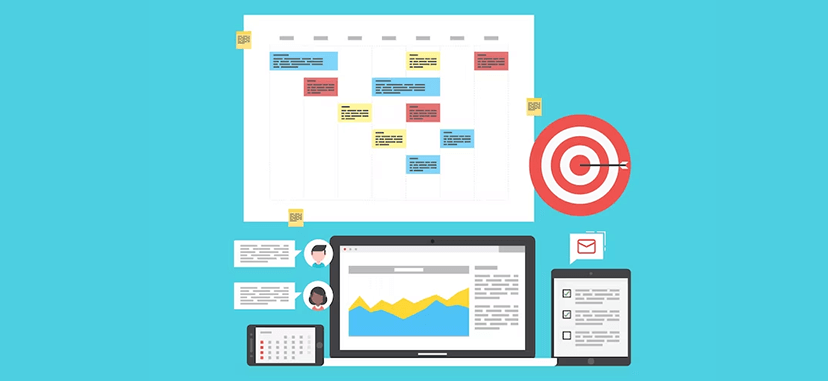
Click the button to start reading
Elevate Your Project Coordination: Unlock the Secrets to Project Management Success
Are you on a quest to master project coordination and achieve unparalleled project success? Look no further. In this guide, we’ll explore the ins and outs of project coordination and share valuable insights to help you elevate your skills to new heights. So, sit back, relax, and let’s unlock the secrets to project management success together!

The ABCs of Project Coordination
What exactly is project coordination? At its core, project coordination is about making plans, setting schedules, and keeping track of things that have to do with a project. This can include things like organizing the team’s resources, giving members of the team tasks and activities to do, keeping track of how well goals and objectives are being met, solving problems that come up during the project, and making sure deadlines are met.
Project coordination is an essential part of effective project management. It helps ensure that all members of the team are working towards common goals and objectives while at the same time allowing for flexibility in how those goals are achieved. Proactively coordinating tasks and activities within a given timeline and budget helps keep projects on track and prevent unnecessary delays or cost overruns.
Project management vs. project coordination?
It’s easy to get confused between project management and project coordination. It’s important to remember that while they both have the same end goal of successful project completion, their roles are quite different.
Project management usually means keeping an eye on how a project is planned and carried out as a whole. Project coordination, on the other hand, is more focused on the specific tasks that go along with the project, such as scheduling resources, managing communication, and keeping track of progress.
It’s also worth noting that while project management is typically handled by a single individual or team of individuals, project coordination is often done collaboratively with other members of the team.
The 2 Legs of Project Coordination
Now that we’ve laid the groundwork for understanding what project coordination is, it’s time to dive deeper into the essential components that make it so crucial for project management success.
These key aspects are the building blocks that will enable you to efficiently and effectively manage your projects, paving the way for success. Let’s break them down and explore how they interconnect to create a robust foundation for stellar project coordination:
1. Control and Coordination
At its core, project coordination revolves around controlling and coordinating tasks and activities within a given timeline and budget. This involves monitoring progress toward goals and making the appropriate adjustments.
- Monitoring progress: Keep a close eye on the project’s progress, ensuring everything stays on track and within the timeline. By vigilantly monitoring progress, you’ll be able to identify potential issues before they become major problems and make informed decisions that keep your project on the path to success.
- Adjusting plans as needed: In the dynamic world of project management, change is inevitable. To be a successful project coordinator, you must be flexible and adaptable, making necessary adjustments to the project plan when unforeseen challenges arise. Embracing change and responding proactively will help you maintain control over your projects and ensure they stay on course.
2. Interface Coordination
Another important aspect of project coordination is interface management, which involves providing a link between different stakeholders and functions. In essence, this means facilitating communication among team members and managing interdependencies between tasks.
- Facilitating communication: As the facilitator of communication within a project, you are responsible for maintaining clear lines of dialogue among all involved stakeholders. This will enable team members to stay on the same page and remain aligned with project goals.
- Managing interdependencies: As you coordinate tasks and activities, it’s essential to consider the impact of each task on other elements of the project. It’s important to recognize which aspects are dependent on one another and ensure that their execution is closely monitored and coordinated for maximum efficiency.
Project Coordination in Action
To bring it all together, let’s take a look at a few examples of project coordination:
EXAMPLE: 1 – Coordinating a product launch
Imagine you’re launching a new product. You’ll need to make sure that your marketing, sales, and production teams all work together to make a successful launch. As the project coordinator, you’ll be the glue that holds everything together, managing deadlines, resources, and communication.
EXAMPLE: 2 – Organizing a software development project
In this scenario, you’ll be coordinating the efforts of developers, designers, QA testers, and product managers. To make sure the software is developed, tested, and released quickly and well, you’ll need to manage the project timeline, keep track of progress, and help team members talk to each other.
EXAMPLE: 3 – Managing a marketing campaign
Here, you’ll be juggling multiple elements such as content creation, social media, and advertising. As the project coordinator, it will be your job to make sure that all parts of the campaign run smoothly and that everyone works together to meet the goals and objectives of the project.

Rock Your Coordination Skills: Becoming the Ultimate Project Coordinator
So, you’ve got a grasp on what project coordination is all about, but how can you take your skills to the next level? Just like any superhero, a project coordinator needs a special set of skills to truly shine.
In this section, we’ll dive into the essential skills that will help you navigate the complex world of project coordination with ease and confidence. Ready to level up? Let’s jump right in…
Planning Prowess
It all starts with a vision. Like a skilled captain navigating through uncharted waters, you need a clear roadmap to guide your team to success. When setting goals
and objectives for your project, remember the SMART criteria: Specific, Measurable, Achievable, Relevant, and Time-bound. This way, everyone on your team knows exactly what’s expected, and you can celebrate those small victories along the way.
Communication Conqueror
Let’s face it: communication can make or break a project. Think back to a time when a simple miscommunication snowballed into a bigger issue—we’ve all been there, right? As a project coordinator, it’s your job to keep the lines of communication open and flowing. Create a good plan for communicating with your team, give them the right tools, and encourage them to talk in an open and honest way. After all, a well-informed team is a well-functioning team.
Problem-Solving Superhero
The ability to think on your feet is an essential skill for any project coordinator. When things don’t go according to plan, you need to be able to quickly assess the situation and come up with effective solutions. Keep your cool in a crisis and stay open-minded—the answers can often be found in the most unexpected places.
Time Management Wizard
Time is a project coordinator’s most valuable resource. You need to be able to read the landscape and prioritize tasks in order to get the most out of your team and resources. Set realistic deadlines, break large projects into smaller chunks, and don’t forget to factor in some time for yourself.
Master the Art of Delegation
Delegation might seem like a no-brainer, but it’s an art that requires practice and finesse. Remember that time you tried to do everything yourself, only to realize that you were spreading yourself too thin?
Yep, we’ve been there too. As a project coordinator, it’s essential to know your team members’ strengths and weaknesses, assign tasks based on expertise and capacity, and trust your team to deliver results. By delegating effectively, you can focus on the big picture while your team members shine in their respective roles.
Keep an Eye on Progress and Adapt to Change
We all know that projects rarely go exactly as planned. You might even have a few “plot twist” stories of your own, right? In the ever-changing world of project management, adaptability is key.
Make it a habit to monitor your project’s progress regularly, identify potential roadblocks and bottlenecks, and be prepared to make adjustments and pivot when necessary. Embrace change and view it as an opportunity for growth – your team and your projects will thank you for it.
Tech-Savvy Guru
The world of project management is constantly evolving, and you need to be a step ahead. Get familiar with the latest tools and equip yourself with the technical skills necessary to manage projects more efficiently and effectively.

Nailing the Coordination Process
You’ve got the essential skills in your project coordination toolkit, but how do you put them into practice? In this section, we’ll walk you through the key stages of the project coordination process, complete with anecdotes and examples to make it feel like a real-life adventure. So grab your metaphorical compass, and let’s chart the course to project success.
1. Define Your Project with Precision
Picture this: you’re coordinating a team tasked with redesigning a company’s website. To set the stage for success, you’ll need to start by clearly defining your project’s goals, scope, and deliverables.
For example, your goal could be to increase conversions by 20% in three months, and your scope may include revamping the site’s design, improving the user experience, and optimizing SEO. By laying a solid foundation and clarifying the project’s objectives, you’ll provide your team with a roadmap to guide them every step of the way.
2. Create a Kickoff Celebration
Imagine how exciting it would be to start a new project to make a mobile app for a local charity. To kick things off, gather your team for a virtual or in-person meeting filled with energy and enthusiasm.
Use this opportunity to introduce the project’s objectives, share the vision, and align everyone’s roles and responsibilities. This kickoff celebration is your chance to set the tone for a positive and productive journey ahead.
3. Keep Those Tasks in Check
You’re now coordinating a marketing campaign for a new product launch. To ensure smooth sailing, break down the project into bite-sized tasks and assign them to your team members.
For instance, Sarah may be in charge of creating social media content, while Tom focuses on crafting the perfect email sequence. Regularly check in with your team to make sure they have the resources and support they need to tackle their tasks like champions.
4. Monitor Progress like a Hawk
No doubt, you’ve got a few projects under your belt that didn’t go as expected. To help prevent this from happening again, keep an eye on how things are going and course-correct when necessary.
Let’s say you’re in the midst of a software development project, and milestones are coming up fast. As a project coordinator, it’s crucial to keep a close eye on your team’s progress. Hold regular status update meetings and use tools like Gantt charts or Kanban boards to visualize the tasks and deadlines. By being proactive and spotting potential problems early, you can make sure that your project stays on track while any risks are dealt with in the right way.
5. Let’s Make a (Project) Change
Unexpected changes are a natural part of any project. Imagine you’re organizing a large-scale event, and a key speaker suddenly cancels. Instead of freaking out, use your problem-solving skills to figure out how the change will affect you and what other options you might have.
Work closely with your team and stakeholders to reach a consensus and update the project plan accordingly. By staying adaptable and open to change, you’ll navigate any curveballs with grace and resilience.
6. Bring It Home: Project Closure
The day has finally come: you’ve successfully coordinated a major office relocation, and it’s time to wrap things up. As you approach the project closure phase, remember to evaluate the project’s performance against its initial goals and objectives.
Gather your team for a final meeting to celebrate your accomplishments, share lessons learned, and discuss areas for improvement. By acknowledging the hard work put in, you’ll inspire your team to strive for success in their next projects.

Control and Coordination With the Perfect Tool
In the fast-paced, ever-changing world of project management, having the best tools in your arsenal can make all the difference.
That’s where Teamly comes in. This powerful platform can help streamline your project coordination efforts and ensure your team stays on track. Let’s explore how Teamly can support your project coordination journey, including its innovative screen capture software.
Centralizing Project Information
One of the key challenges in project coordination is keeping everyone in the loop. Teamly makes this easier by giving your team a single place where they can find project information, documents, and updates. No more searching through endless email chains or getting lost in a sea of shared files—everything you need is at your fingertips.
Utilizing Project Management Tools
Teamly has a wide range of features for managing projects that can help you coordinate better. Some of the standout features include:
- Visual tools for planning and progress tracking: Create Kanban boards, or timelines to keep a clear view of your project’s progress.
- Task management: Assign tasks to team members, set deadlines, and monitor progress with ease.
- Collaboration tools: Facilitate communication and collaboration among your team with built-in messaging, file sharing, and more.
- Screen capture software: Keep track of your team’s work and foster accountability with Teamly’s screen capture feature, perfect for remote teams and tracking progress on tasks.
Regular Team Meetings and Check-ins
Effective communication is the backbone of project coordination, and Teamly helps you stay connected with your team. Schedule regular meetings and check-ins through the platform to ensure everyone is on the same page and to address any issues that may arise. This way, you can maintain a pulse on your project’s progress and keep your team engaged and motivated.
Project Coordination Experience with Teamly
Teamly is a great tool for project coordinators of all levels because it is easy to use, has powerful features, and uses innovative screen capture software. Whether you’re new to the world of project coordination or a seasoned veteran, Teamly can help you streamline your processes, improve communication, and enhance overall project performance.
By integrating Teamly into your project coordination efforts, you’ll be able to maintain better control over your projects, foster a collaborative environment, and ultimately, achieve greater project success. So, embrace the power of Teamly and watch your project coordination skills soar to new heights!

Level Up Your Coordination Skills with 7 Pro Tips
Ready to level up your project coordination game? Check out these seven pro tips that will help you dial in your effectiveness and achieve project success:
1. Conquer Tasks Like a Boss: Eisenhower Matrix
Don’t let an overwhelming to-do list bring you down. Use the Eisenhower Matrix to prioritize tasks based on urgency and importance. By separating the “need-to-do-now” from the “can-wait-a-bit,” you’ll manage your time like a pro and keep your project on track.
2. Communication Central: Establish a Clear Plan
To avoid misunderstandings and keep your team in sync, develop a solid communication plan. Outline the preferred channels, frequency of updates, and key stakeholders. Remember, a well-informed team is a happy and productive team!
3. Tech It Up: Embrace Collaboration Tools
In today’s digital age, collaboration tools can be your best friend. From messaging platforms to file-sharing services, these handy tools streamline communication and keep everyone on the same page.
4. Party Time: Celebrate Milestones & Lessons Learned
Take the time to acknowledge your team’s hard work by celebrating milestones and reflecting on lessons learned. These moments of recognition not only boost morale but also encourage continuous improvement.
5. Stay Agile: Regularly Review & Adjust Plans
The only constant in project management is change. Regularly review your project plans and be prepared to make adjustments as needed. This proactive approach will help you stay ahead of the curve and keep your projects running smoothly.
6. Share the Load: Delegate Tasks and Empower Team Members
You can’t do it all alone! Delegate tasks to your team members and trust in their abilities. By empowering your team, you’ll foster a sense of ownership and accountability that leads to better project outcomes.
7. Knowledge is Power: Stay Informed on Industry Trends and Best Practices
To stay at the top of your game, keep up with the latest industry trends and best practices in project coordination. Attend conferences, read articles, and network with fellow professionals. The more you learn, the more effective you’ll be as a project coordinator!

Tackle Project Coordination Challenges Like a Pro
You’ve already learned about the essential skills and processes for successful project coordination, but let’s not forget that every project comes with its own set of challenges. In this section, we’ll dive into demystifying scope creep, balancing stakeholder expectations, and navigating conflicts and resource constraints.
Scope Creep Demystified: Keep It in Check
Scope creep is when a project’s goals and requirements change over time, which often causes delays and budget overruns. To prevent scope creep from derailing your project, make sure to:
- Clearly define the project scope from the start
- Involve stakeholders in scope discussions
- Regularly review and approve changes through a formal process
Harmony in Stakeholder Land: Balance Expectations
- Identify and prioritize stakeholder needs
- Communicate regularly and transparently
- Manage expectations by setting realistic goals
Conflict Navigator: Smooth Team Relations
Team conflicts are inevitable, but they don’t have to derail your project. Here’s how to address them effectively:
- Encourage open communication and active listening
- Resolve disputes through mediation or compromise
- Foster a positive team culture that values collaboration
Resource Constraints: Face Them Head-On
Resource constraints can put a damper on your project’s progress. Tackle them head-on by:
- Regularly reviewing and optimizing resource allocation
- Identifying and mitigating potential bottlenecks
- Being proactive in requesting additional resources when needed

Level Up Your Coordination Game: Training & Development
Even the most experienced project coordinators can benefit from continuous learning and growth. By investing in your professional development, you’ll not only stay ahead of the curve but also become an even more effective and confident project coordinator. Let’s explore some ways you can level up your project coordination game.
Lifelong Learning: Embrace the Journey
The world of project management is constantly evolving. To stay at the top of your game, commit to ongoing learning by:
- Attending industry conferences and seminars
- Subscribing to project management blogs and podcasts
- Participating in online forums and discussion groups
Certify Your Greatness: Professional Certifications
Earning a professional certification can boost your credibility and give you a competitive edge. Consider pursuing certifications such as:
- Project Management Professional (PMP)
- Certified Associate in Project Management (CAPM)
- Agile Certified Practitioner (PMI-ACP)
Expand Your Skill Set Universe
Expand your skill set by diving into new areas of expertise that complement your project coordination role:
1. Master New Tools & Languages
Stay competitive in the job market by mastering new software tools or learning a programming language. This additional expertise can help streamline your project coordination tasks and improve your overall efficiency.
2. Lead & Connect: Interpersonal Skills Upgrade
Invest in your leadership and interpersonal skills through training courses or workshops. Strong communication and leadership abilities are essential for successful project coordination and team collaboration.
3. Negotiation & Conflict Resolution Power-Up
Enhance your negotiation and conflict resolution skills by taking relevant courses or attending workshops. These skills will help you navigate challenging situations and maintain harmonious relationships within your team.
Peer Power: Learn from Your Fellow Coordinators
Your fellow project coordinators can be an invaluable source of knowledge and inspiration. To learn from their experiences, make a point to:
1. Local Associations & Clubs: Find Your Tribe
Connect with other project management professionals by joining local associations or clubs. These groups offer opportunities to network, learn from peers, and share your own insights.
2. Networking Events & Workshops: Connect & Grow
Expand your professional network and learn from others by attending networking events, workshops, and meetups. These events often feature guest speakers and provide a chance to exchange ideas and best practices with fellow project coordinators.
3. Mentorship Magic: Give & Receive Wisdom
Find a mentor who can guide you in your career, or offer your expertise as a mentor to someone else. Mentorship is a powerful way to share knowledge, learn from others’ experiences, and grow both personally and professionally.

Conclusion: Unleashing Your Project Coordination Potential
There you have it! With this wealth of knowledge and valuable insights, you’re ready to elevate your project coordination skills to new heights. Remember, project coordination is essential for successful project management, and by continuously honing your abilities, you’ll make a tremendous impact on your team and organization.
Embrace the power of effective project coordination, and don’t forget to leverage innovative tools like Teamly to streamline your processes and bring out the best in your team. As you continue on this journey, you’ll not only boost your own career but also create a positive ripple effect throughout your organization.
So, go ahead and unleash your project coordination potential. With determination and the right mindset, there’s no limit to what you can achieve in the world of project management. Cheers to your future success!
















